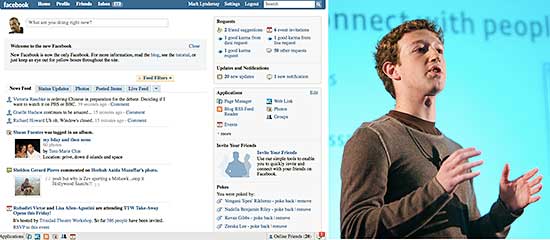BitDepth 649 - October 14
13/10/08 10:45 Filed in: BitDepth - October 2008
Facebook's changes say more about the character of the company than it might like.
Why Facebook is crap

The new Facebook and its owner, Mark Zuckerberg.
Here's the thing about Facebook.
It isn't a new idea, and it isn't a particularly original one. What it is, though is free. In that it doesn't cost you money. What it does cost you is the learning experience of working with the web directly.
The idea of putting a more accessible face on the hardcode guts of the Internet is as old as the Delphi online service, which was overtaken by Prodigy and then by America Online, the most successful effort at creating an online community until the Internet exploded.
AOL death watch began when accessing the Internet became something easily separated from using that company's software. Free protocols for creating web pages, transferring files, sending e-mails and chatting online trumped the commerce driven convenience of AOL's business model.
Now Facebook is bringing simplicity back. You can send fellow Facebook users e-mails, text chat with anyone who's online, create community pages and post photos and information on what seemed to be a customer focused web service.
The new Facebook
The first inkling that avid Facebook users had that the company hosting all these delightful services wasn't a benevolent sugar daddy was the announcement of the "new" Facebook.
Facebook users comfortable with the old interface immediately went ballistic and the company added a text link to user's pages that allowed them to switch between the new design and the old one.
Then a few weeks ago, Facebook pulled the trigger on their redesign, announcing "the new Facebook is the only Facebook." The new interface, with a few adjustments, became the only option for Facebook users.
The group "I Hate The New Facebook" currently has 1,544,351 members and there are many more in various "Facebook sucks" pages. To its credit, the company and its 24-year-old founder leave these dissenting group pages alone.
Shouldn't change be good?
Part of that change, and the one that annoyed hardcore users the most, was the relegation of non-Facebook applications, the bits of code that made the website's experience so interesting, are now relegated to a sidebar and to a ghetto of "boxes" three tabs away from a user's home page.
Many of these third party applications don't work on the sidebar and some don't work at all any more. Developers are likely to be concerned about creating and updating features for the website that most casual users will never find.
This wouldn't be so bad if Facebook were paying attention to what their users like and use, but that doesn't seem to be the case.
Photos, one of the most popular parts of any user's Facebook page, have no prominence on a user's home page and Facebook native features that link to external websites don't work particularly well. There is no functional RSS reader and the web clip software, which claims to share links to external websites is simply abysmal.
Why bother?
So why create this massive upheaval and change the user experience so fundamentally? You can deduce a lot from the result. Today's Facebook is spare and clean, with no cows being thrown at anyone or vampires being chumped. It looks like an effort to position the service for the kind of maturing users who prefer the spare, business focused interface of services like Plaxo and Linkedin.
But Facebook's history of playing fast and loose with user information may deter business from embracing the service, though the misguided users who make their pages private (hiding on a social network?) will probably be pleased.
Still, that shouldn't be a problem for Facebook's business. Ranked fifth in the world by web traffic monitor Alexa, the site has 110 million users and more than 70,000 from Trinidad and Tobago alone. It clearly has the eyeballs to lure advertisers.
But Facebook's lack of interest in the virtual world outside its tasteful blue and white walls may ultimately be its undoing.
You can post and share on Facebook, but there's little incentive to create work that lives on the site.
Blogs are still better handled using purpose built sites like Blogger and Typepad, and nothing touches Flickr for sharing photographs and tracking visual trends. When users grow weary of Facebook's web training wheels, there isn't much sophistication to keep learning; growing web citizens interested.

The new Facebook and its owner, Mark Zuckerberg.
Here's the thing about Facebook.
It isn't a new idea, and it isn't a particularly original one. What it is, though is free. In that it doesn't cost you money. What it does cost you is the learning experience of working with the web directly.
The idea of putting a more accessible face on the hardcode guts of the Internet is as old as the Delphi online service, which was overtaken by Prodigy and then by America Online, the most successful effort at creating an online community until the Internet exploded.
AOL death watch began when accessing the Internet became something easily separated from using that company's software. Free protocols for creating web pages, transferring files, sending e-mails and chatting online trumped the commerce driven convenience of AOL's business model.
Now Facebook is bringing simplicity back. You can send fellow Facebook users e-mails, text chat with anyone who's online, create community pages and post photos and information on what seemed to be a customer focused web service.
The new Facebook
The first inkling that avid Facebook users had that the company hosting all these delightful services wasn't a benevolent sugar daddy was the announcement of the "new" Facebook.
Facebook users comfortable with the old interface immediately went ballistic and the company added a text link to user's pages that allowed them to switch between the new design and the old one.
Then a few weeks ago, Facebook pulled the trigger on their redesign, announcing "the new Facebook is the only Facebook." The new interface, with a few adjustments, became the only option for Facebook users.
The group "I Hate The New Facebook" currently has 1,544,351 members and there are many more in various "Facebook sucks" pages. To its credit, the company and its 24-year-old founder leave these dissenting group pages alone.
Shouldn't change be good?
Part of that change, and the one that annoyed hardcore users the most, was the relegation of non-Facebook applications, the bits of code that made the website's experience so interesting, are now relegated to a sidebar and to a ghetto of "boxes" three tabs away from a user's home page.
Many of these third party applications don't work on the sidebar and some don't work at all any more. Developers are likely to be concerned about creating and updating features for the website that most casual users will never find.
This wouldn't be so bad if Facebook were paying attention to what their users like and use, but that doesn't seem to be the case.
Photos, one of the most popular parts of any user's Facebook page, have no prominence on a user's home page and Facebook native features that link to external websites don't work particularly well. There is no functional RSS reader and the web clip software, which claims to share links to external websites is simply abysmal.
Why bother?
So why create this massive upheaval and change the user experience so fundamentally? You can deduce a lot from the result. Today's Facebook is spare and clean, with no cows being thrown at anyone or vampires being chumped. It looks like an effort to position the service for the kind of maturing users who prefer the spare, business focused interface of services like Plaxo and Linkedin.
But Facebook's history of playing fast and loose with user information may deter business from embracing the service, though the misguided users who make their pages private (hiding on a social network?) will probably be pleased.
Still, that shouldn't be a problem for Facebook's business. Ranked fifth in the world by web traffic monitor Alexa, the site has 110 million users and more than 70,000 from Trinidad and Tobago alone. It clearly has the eyeballs to lure advertisers.
But Facebook's lack of interest in the virtual world outside its tasteful blue and white walls may ultimately be its undoing.
You can post and share on Facebook, but there's little incentive to create work that lives on the site.
Blogs are still better handled using purpose built sites like Blogger and Typepad, and nothing touches Flickr for sharing photographs and tracking visual trends. When users grow weary of Facebook's web training wheels, there isn't much sophistication to keep learning; growing web citizens interested.
blog comments powered by Disqus

